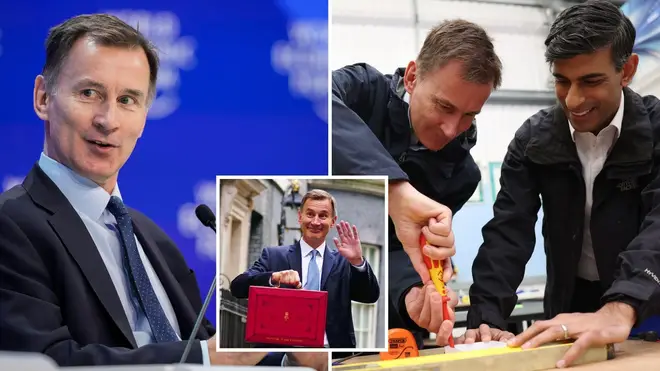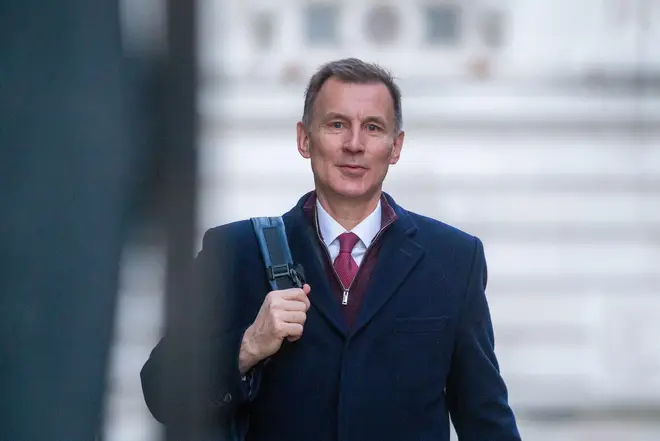
Shelagh Fogarty 1pm - 4pm
20 January 2024, 21:44

The Conservatives will slash taxes at the March 6 budget, Chancellor Jeremy Hunt has suggested, as the party makes a last-ditch effort to stave off a general election obliteration when voters head to the polls later this year.
Mr Hunt said today the Government's "plan is working" and "we need to stick to it". He said this would mean "cutting taxes", as he hinted at the contents of his set-piece fiscal event in the coming weeks.
Writing in the Mail On Sunday, the Chancellor likened his record to that of Conservative Party grandee Lord Lawson, who slashed personal taxation while serving in the Thatcher government.
In his two budgets prior to the 1987 election, Lord Lawson famously cut both the standard and top rate of income tax to reignite what was believed to be a slowing economy.
However, critics of Lawson's policy argue his economic mechanisms saw inflation quickly spin out of control, leading to a 20 per cent increase in house prices. Lord Lawson was later forced to double interest rates as inflation spiraled up.
But writing today, Mr Hunt said he would use his March 6 budget to cut taxes so it was "both affordable and boosts our growth".

Read More: Jeremy Hunt hints at tax cuts ahead in March Budget, as he admits voters are 'angry'
Read More: Sunak ‘not available’ for talks with Drakeford on steel job losses
Mr Hunt said: "Just as Nigel Lawson positioned the City of London for the finance boom in the 1980s, this period of Conservative Government has seen the UK positioned for the massive technological boom we're set to see in the coming years."
The Chancellor justified his budget plans as "most dynamic economies tend to be places with lower taxes."
"The lesson is clear: supporting businesses with competitive taxes - not more government spending - is the way to growth," he said.
"The plan is working. That’s why we need to stick to it. It means cutting taxes, not raising them."
It comes as Rishi Sunak on Friday said there is "more to come" in terms of tax cuts following this month's reduction in national insurance contributions.
Following the announcement in the Chancellor's autumn statement in November, the main rate of national insurance was reduced by two percentage points, from 12% to 10%, on January 6. The Treasury says the change means a worker on a £35,000 salary will be £450 better off a year.
Labour at the time branded the move a "raw deal" as Mr Hunt kept tax thresholds frozen, resulting in a de facto tax rise for millions as their wages increase with inflation while tax bands remain static.

Read More: Governments need ‘light touch’ regulation on AI, cautions Jeremy Hunt
Ahead of the budget and the suggested tax-cuts, the Government has been handed a multibillion-pound boost by the Office for Budget Responsibility, who predict lower UK borrowing costs could give the Chancellor significantly more fiscal headroom when unveiling his plans.
The Financial Times reported that Mr Hunt could be handed up to £10 billion boost against his fiscal targets in OBR forecasts, paving the way for deeper tax cuts.
Economists said this could stem from lower borrowing costs on Government debt although the headroom could still be limited by a deteriorating economic outlook and new figures on public borrowing levels, according to the newspaper.
A further cut to already-squeezed Government departments' budgets is being considered by the Treasury to fund tax cuts if there is no new headroom.
Official figures this week revealed a shock drop in retail sales in December - the biggest since January 2021.
But Mr Hunt struck an optimistic note, writing in his op-ed that conversations at the World Economic Forum in Davos had left him "brimming with confidence about the fundamental strengths of the British economy".
The first OBR forecast next week will spark discussions among ministers about what taxes to slash and by how much, with personal tax cuts thought to be favoured.
Mr Hunt will use his March 6 Budget to draw fresh battle lines with Labour ahead of a general election.
He could look to spend all the headroom he is given in a bid to shrink an incoming Labour government's room for manoeuvre and force it into tax rises to fund its spending plans.